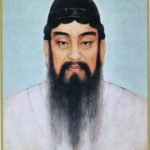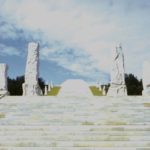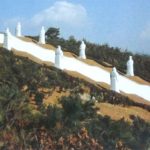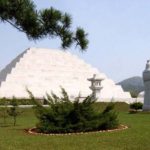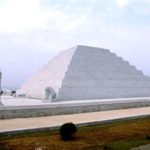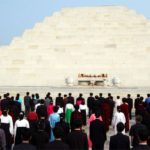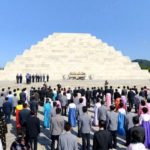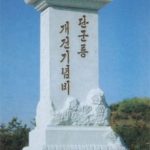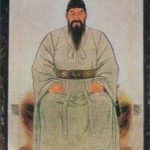Mausoleum of King Tangun, situated at the foot of Mt. Taebak in Munhung-ri, Kangdong County, Pyongyang, is a holy place showing the time-honored history of the homogeneous Korean nation.
Tangun, founder king of Korea, set up Ancient Joson, the first slave state in Korea, in the early 30th century B.C. His mausoleum is a precious historical relic which proves the 5 000-year-long history of the Korean nation.
It was rebuilt with trimmed pieces of granite in October Juche83 (1994).
Covering an area of 45 hectares, it is divided into three sections: the monument to the renovated mausoleum, stone sculptures and the chamber of the grave.
The section of the monument to the renovated mausoleum consists of the gate, the Monument to the Renovated King Tangun’s Mausoleum and the Monument to Tangun’s Achievements.
In the section of stone sculptures the sculptures of eight close subjects of the king and those of his four princes stand along the stairs, in the order of the ranks of their posts in those days.
Three stone gates at the back of the mausoleum lead to the chamber of the grave, each weighing over 1.2 tons. Preserved in the chamber are the remains of King Tangun and his wife in a special transparent glass coffin.
The mausoleum is square pyramid-shaped. The number of piled-up stone pieces amounts to 1 994, which symbolizes its construction year of 1994. The biggest stone piece weighs 21 tons. The mausoleum is 22 m high and the base of its bottom is 50 m long.
In front of the mausoleum stand a stone table and a stone incense burner. At the four corners stand four stone tigers and a pair of stone daggers. The stone tigers, which are 3.5 m high and 6.2 m long and weigh 90 tons, symbolize the wisdom and valor of the Korean ancestors who built a strong state in the Orient. The 7-m-high stone dagger, depicting a short pipha-shaped dagger peculiar to Ancient Joson, shows a high level of civilization and enterprising spirit of the Korean ancestors.
The mausoleum has many legends related to the customs of the Korean nation that regarded it as a virtue to sanctify their founder king and hold him in high esteem.

